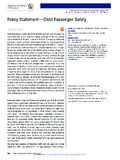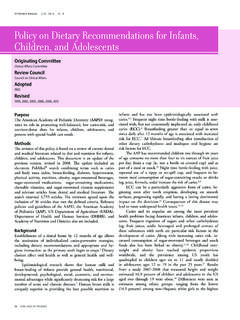Transcription of Depression in the Workplace - ENWHP
1 Depression in the Workplace policy recommendations on how to tackle the leading cause of disability worldwideStephen Hughes MEP Initiative on Depression in the 11:40 The Stephen Hughes MEP Initiative on Depression in the Workplace is sponsored by Lundbeck 2 Depression in the 11:403 Depression in the WorkplaceForewordStephen HughesMember of the European Parliament from the United Kingdom for the Group of the Progressive Alliance of Socialists and DemocratsOver the past few years, I have been working on the topic of Depression in the Workplace in my capacity as a long-standing Member of the Employment and Social Affairs Committee. My interest in this important topic, which has direct consequences on the lives of an individual and his or her family, friends and co-workers, led me to start an initiative entitled Depression in the Workplace . Under its umbrella, I, along with my fellow MEPs, hosted several meetings that brought together key experts in this area to share their experiences and expertise on this topic.
2 Depression is a serious condition, whose impact on the Workplace is very high. This disease has the ability to lower an individual s capability of functioning in the Workplace and in some cases renders employees incapable of performing their jobs and function in their daily lives (cognitive effects of Depression ). I am proud to see the launch of this important recommendations paper, which is a major step towards making Depression a priority in employment policies at EU level and across Europe. I would like to thank the leading European experts who have contributed their time and knowledge to make this paper a reality, and to thank my fellow MEPs for their commitment to putting focus on Depression as a major future challenge for Europe and for their support for this recommendations Werthmann Member of the European Parliament from Austria for the Alliance of Liberals and DemocratsThe launch of this recommendations paper is an important milestone towards raising awareness of Depression and its consequences for the individual and society in particular due to its effects in the Workplace .
3 The recommendations paper is a fi rst step towards increasing the knowledge of psychosocial risks and addressing the stigma associated with mental health problems, which often leads employees to hide their conditions from their colleagues and employer. In my work with the Women s Rights and Gender Equality Committee, I have made it a priority to address the consequences of Depression in women, both in relation to specifi c mental health risks for women in the Workplace and Depression in other phases of women s lives such as Depression following childbirth. As an MEP, tackling Depression in and outside the Workplace remains a personal and political priority of mine, and I look forward to continue working for the inclusion of Depression in relevant CostelloMember of the European Parliament from Ireland for the Group of the Progressive Alliance of Socialists and DemocratsAs a Member of the European Parliament, I have become increasingly aware and concerned about the consequences of Depression in the Workplace in Ireland and across Europe.
4 Rising unemployment, job insecurity and more stressful working conditions have led to an increase in Depression and Depression -related suicides. I have been following and am enormously impressed by the work of the Irish organisation Aware, which seeks to help patients and their families overcome Depression . 11:404 Depression in the WorkplaceTackling Depression in the Workplace should be a major European priority, primarily through the European Pact on Mental Health and Wellbeing and the EU Strategy on Health and Safety at Work (2013-20). I am strongly committed to ensuring that Depression receives the attention it deserves, at both European and at Member State level, and am grateful for the opportunity to contribute to addressing this major societal Steinruck Member of the European Parliament from Germany for the Group of the Progressive Alliance of Socialists and DemocratsAs a Member of the Employment and Social Affairs Committee in the European Parliament, I am pleased about the launch of this recommendations paper, which addresses Depression as one of the most important challenges that needs to be addressed in occupational health and safety, if we are to ensure the sustainability of work life in Europe.
5 In my work within the Stephen Hughes Initiative on Depression in the Workplace , I have become aware of the scale of the problem of Depression in the Workplace and the immense costs to the individual and society, and as such I am strongly committed to work towards ensuring that these recommendations are refl ected in policies at EU and national Cercas Member of the European Parliament from Spain for the Group of the Progressive Alliance of Socialists and DemocratsAs a contributor to the Stephen Hughes Initiative on Depression in the Workplace , I am pleased to see that our work over the past two years is coming together in this highly relevant paper. However this is only the fi rst step towards tackling Depression in the Workplace , and much work is still left to be done. Going forward I am particularly keen to work towards seeing these recommendations refl ected in concrete policy action by the European Parliament. Starting with the forthcoming revision of the Strategy on Health and Safety at work, I am committed to fi ght this important battle towards the inclusion of Depression and psychosocial risks as a priority in all relevant policies, together with my colleagues from the different political Kastler Member of the European Parliament from Germany for the European People s PartyThe signifi cance of addressing Depression in the Workplace is immense, and it is crucial that this is not overlooked when developing future health and safety at work policies.
6 As Rapporteur for the proposal for a decision of the European Parliament and of the Council on the European Year for Active Ageing (2012), I am especially aware of the signifi cance of ensuring good mental health and preventing Depression , as a prerequisite for keeping individuals active and healthy throughout their working life, which is a necessity to ensure that Europe develops in a sustainable way in the face of an ageing population. This recommendations paper makes an important contribution to addressing the cognitive effects of Depression in the Workplace that leads to loss of workability, and I am happy to support this important 11:405 Depression in the WorkplaceI. IntroductionWe are at a defining moment in the way in which we approach the challenge of depressiona among our working populations across has a corrosive effect on the individual s ability to function at home, at work, and within everyday social networks. Symptoms such as sadness and lethargy are often associated with Depression .
7 Less well understood are the cognitive symptoms of Depression that directly affect an employee s ability to function both inside and outside the Workplace . Examples of cognitive symptoms of Depression are lack of concentration, indecisiveness and forget-fulness. If adequately managed, people with Depression can lead productive lives and make valuable contributions to society as a whole: the barriers to societal participation are being progressively weakened by advances in medi-cal management of this frequently disabling cognitive symptoms of Depression can have a large impact in the Workplace , and it is important that this is de-fined and better understood. From there we are in a stronger position to develop effective treatment strategies. The peer-reviewed literature makes the case all too often that application of guideline-supported standards of care can help restore the lives and productivity of many. When Depression has been diagnosed, multidimensional treatment strategies can reduce cognitive and other symptoms of Depression .
8 Such intervention can directly increase atten-dance at work and productivity while at work. Healthcare professionals working in communities and hospitals strive to apply the accepted standards of care to their patients. But for many people with Depression , this treatment can be suboptimal or absent. Moreover, many with Depression struggle to make sense of what they are experiencing, and all too often will be unwilling or unable to seek professional help. These obstacles can lead to a downward spiral of performance at work causing financial loss to both the employer and the employee, further escalating to become a burden on society at large as worsening illness is left untreated. There are important differences between the employer-employee relationship, and the doctor-patient interaction. While healthcare professionals rely on the individuals to explain the scope of any problems, employers have objec-tive measures of productivity and subjective reports of social function provided by the affected employees and their colleagues.
9 In addition, employers have specific and well-defined reasons to discuss an employee s performance and where necessary to encourage changes in behaviour. This creates an opportunity for policy makers to better support effective interventions by employers. Indeed it is the prerogative of policy makers to support employers in their efforts to reduce the impact of depressi-on on the individual employee, society and ultimately businesses across Europe. Such initiatives will yield benefits that extend beyond the Workplace ; this is as much about broader health policy as employment policy . Moreover, any changes may also benefit the large numbers of unpaid workers, such as carers and those supporting family businesses, who are often in similar situations and exposed to the same risks as paid workers. The case for such intervention has been made, and will continue to be made. As authors of these policy recommendations , it is our objective to improve understanding of Depression in the Workplace and how specific facets of this disease can place a devastating burden on businesses in Europe and their competitiveness worldwide.
10 These recommendations are part of a broader initiative on Depression in the Work-place, which was launched by MEP Stephen Hughes in May 2012. The Initiative is now supported by a cross-party group of Members of the European Parliament who have committed to addressing one of the great public health and employment challenges of our time through the use of policy and legislation. The specific aim of this paper is to advise and sensitise policy makers building employment as well as public health policy and law on approaches to addressing Depression and its cognitive symptoms. The recommendations are applicable both at the European Union level, and within the Member States. Moreover, it is our intention that such recommendations and initiatives be applicable to large and small companies, and to the public and private The term Depression is used throughout this document to mean all forms of Depression , including clinical 11:406 Depression in the WorkplaceII.







